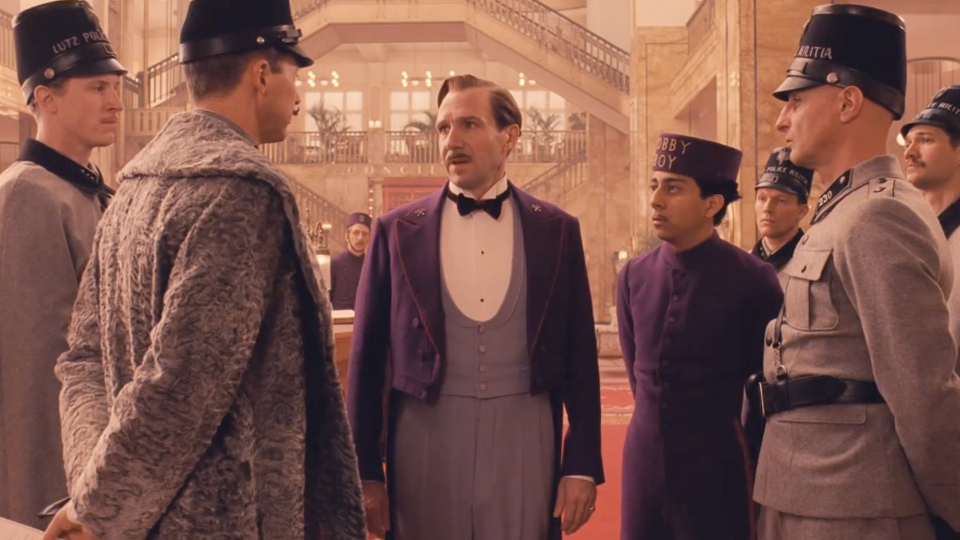The Grand Budapest Hotel (4 1/2 out of 5 Stars)
Directed by: Wes Anderson (Moonrise Kingdom, Rushmore)
Screenplay by: Wes Anderson
Story By: Wes Anderson and Hugo Guinness
Starring: Ralph Fiennes, F. Murray Abraham, Jude Law, Adrien Brody, Tilda Swinton, and introducing Tony Revolori

There is a fantastical nature to the films of director/writer Wes Anderson. In each of his incarnations you are transported to world, which feels like a blend a blend of reality, but often its his sharp wit, and characters which take you away from everyday life. Rushmore, and Bottle Rocket were his most realistic. Enter The Royal Tenenbaums, which begins his exploration of the dysfunctional family, and the continued exploration of a jaded adulthood. The Life Aquatic of Steve Zissou, and The Darjeeling Limited, take to exploring but there is tie to family as well. Family, innocence, and aging often impact his work. While Budapest has these elements there is an evolution to Anderson's work here, an added sophistication to his story telling.
Budapest centers on a story teller, telling the story of a story he hear, sounds familiar to Anderson's style already. The character named Author, yes Author (Tom Wilkinson) starts off this tale as you are transported back to the 1960s and now are faced with Young Writer, yes his name is Young Writer (Jude Law) who is introduced to Mr. Moustafa (Abraham). Moustafa and Young Author, have dinner one evening, and Mr. Moustafa begins to tell the story about how he came to be the owner of The Grand Budapest Hotel.
Mr. Moustafa or at a younger age Zero got a job as a job as a young Lobby Boy in the Hotel, the known as Zero (Revolori). Before Zero could attain the job, he of course had the pass inspection with the concierge Mr. Gustave (Fiennes). The two soon become fast friends. When Madam D. a frequent guest at the Hotel passes away, M. Gustave and Zero head to pay their respects where M. Gustave find out he was bequeathed Madame D's most valuable painting. What ensues is a journey of dedication, friendship, hilarity, and growing up.
In true form Budapest has the typical quirk, and humor like all of his other films, but at the end of the film there is a larger sense of understanding the more serious nature of life. Even if you look at the characters titles in the credits you see they escape their names as young adults, and become more formal. Even Young Writer becomes Author. Does Anderson feel as though he is on the precipice of this evolution. As I sat through the the film there was a definitive evolution in his work, the traditional humor was there, but I felt as though the journey took these characters to a different level, making their journey complete. Anderson has always been able to capture the human spirit, but there is something incredibly personal about the nature of this film, and it makes you feel things I have not often felt in his films.
Part of the credit to the strength of this film go to Ralph Fiennes, and Tony Revolori. The two are dynamic together, and make this experience a fun a journey into mystery, and escapism, adding to the fun nature of the film. Fiennes is an under appreciated actor, still shocked he only has two Oscar nominations. This performance is one of his strongest, it begets his talents as a comedienne; he is not just Amon Goeth or Lord Voldemort, while he can be scary, he is one funny guy. This performance has depth, and is one that deserves to honored, and studied as to how create a strong layered performance.
Anderson succeeds best when he has an ensemble who get his vision, visuals and all. Fiennes has never been a part of this world, but he fit in perfectly. The rest of the ensemble blend together this story perfectly from mainstays Jason Schwartzman, Bill Murray, Owen Wilson, Bob Balaban, and now Tilda Swinton. Adding a few more to his cast of characters Anderson carved out an interesting story, which not explores the evolution of person but the works of Austrian writer Stefan Zweig and the perception of European aristocracy in the 1930s from the the films of Ernst Lubitsch.
The stories of Zweig and films from Lubitsch show the loss of innocence with German advancement in the time of the Nazis. In 1932 you see the visually stunning Grand Budapest, while in the 60s you see this gloomy neon hotel, which loses all personality, disconnecting the occupants who stay there, Young Writer even says the guests often go to this place, avoid eye contact, and use this as place to hide out. As usual the visuals of this sets in an Anderson film are some sumptuous making the experience even better. The visuals are so great you believe the hotel to be a real place, but its a miniature constructed in an abandoned department store. While many take for granted the visuals of Anderson's story there is missing the way every piece of the Production Design team, set things in motion, and then were framed by cinematographer Robert D. Yeoman.
In a world lost the Grand Budapest Hotels of their time were lost to a change in the guard, and Anderson's visuals along with his great story telling ability make you want to be able to visit the pristine setting. The film sets you a journey through time, of a time forgotten with wonderful character studies, this is Anderson's best Direction; he has not only added more to his film canon, but created an extraordinary experience.
No comments:
Post a Comment